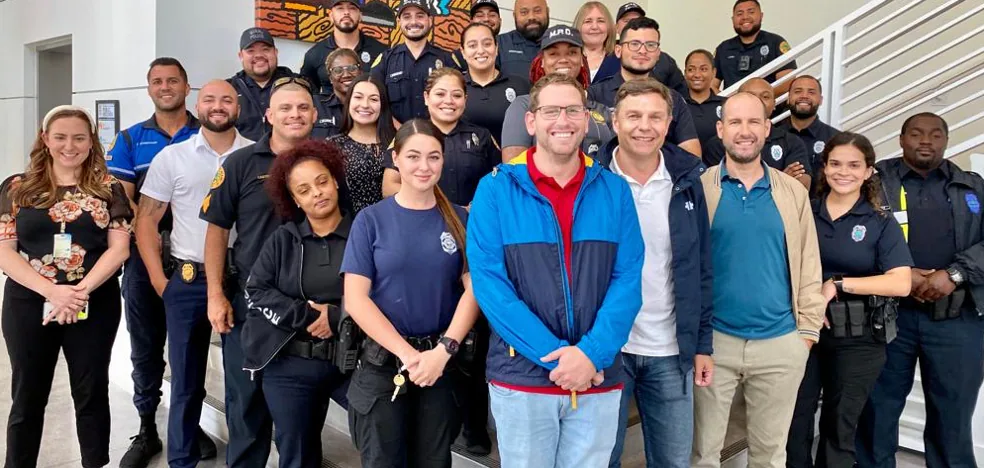Blanc, González and Codina visit the Miami Police mental health training course. /
Local agents will receive training for crisis intervention with the help of Afesol and municipal services
In 1988, the city of Memphis launched a mental health project that is now landing on the Costa del Sol. This is a Crisis Intervention Team (CIT) program known as the ‘Memphis Model’, which aims to help people living with mental illness and/or addiction in crisis situations. This community model seeks to go a step further and involve various community agencies and offer specialized training to security forces and agencies as essential to promoting a safe response in this type of conflict. One of the promoters of this initiative in Malaga is Local Police Mijas ngel Blanc, who will provide this training to agents in collaboration with Afesol and the Fuengirola-Mijas Mental Health Unit.
Blanc has worked for many years as a tutoring agency, and emphasizes that collaboration of different social agencies is essential to offer personalized and true attention. “If cases were treated early, they wouldn’t have become pathologies.” Thus, he began investigating mental health programs in which the police intervened, and found CIT, which more than 4,000 municipalities and cities have complied with, mainly from the United States, Canada and the United Kingdom. “After several years of contact, we arranged a trip to see the entire program on site.”
Police officers from Mijas traveled to Miami last May with Cristian González, from Afesol, and Israel Codina, coordinator of the Fuengirola-Mijas Mental Health Unit, to study and analyze this initiative and thereby establish it on the Costa del Sol.
Specifically, the CIT is a community association of law enforcement, mental health, and addiction professionals, individuals living with mental illness and/or addiction disorders, their families, and other advocates. This first-response model of police crisis intervention training seeks to help people with disabilities access medical care rather than placing them in the criminal justice system, for disease-related behavior, and to promote the safety of police officers and individuals in crisis.
On their expedition, Mijas’ team patrolled one of the special units that had stuffed animals, water and clothes in the vehicle, to get closer to the homeless. “This is a more social cop, not the image we usually have,” explains Blanc, who assured that during an intensive course with 25 Miami police officers he witnessed major changes in them. «We had the opportunity to be there, and we saw how on the third day they changed their attitude, they were much more aware».
While he admits that there are “different” things in the United States model, from legislation to other protocols, “the problems are, in part, very similar, and most programs can be imported into Mijas, in fact we have already started to work from the police with people with mental health problems».
Meanwhile, the person in charge of Afesol emphasized the training of American police in mental health. “They are the first to intervene, they are very sensitive. Ongoing training should be provided so that they know how to work in this type of case. Likewise, it highlights the importance of collaboration between private entities and public administrations. “Here we work in good coordination with employment programmes, special centres, flats… With this social and health support these people can lead a completely normal life.”
In this regard, González ensures that more means and resources are required from the public system. “After the pandemic came a very big wave, we have to defend the figure of a guardian agent in all the police in Malaga.”
The Coordinator of the Fuengirola-Mijas Mental Health Unit, the third member of the expedition to the US, highlighted the quality of this initiative to address the evolving problem. “The demand for mental health and problems in adolescence is doubling. What CIT is trying to do is prepare all social agencies to prevent people with mental disorders from being approached by the justice system, not the health system».
Thus, the aim is to establish a community network towards early detection and intervention in centers for the education and treatment of patients with disorders living on the street, all coordinated between the police, associations and social services. «This is an action already underway in our program ‘Conecta Salud Mental’. It gave us very good results and what we have to do is make it sustainable over time, this is the way to go and we have been able to prove it in Miami”.
The proposal thus began its journey, with the aim of transferring it to other Andalusian cities. Mijas has been awarded several times for the ‘Agent Tutor’ programme: in the 2021 National Award for Tutor Agents for good practice for his Mental Health programme; award for excellence for the School Attendance Program at the 1st National Tutor Agent Awards in 2019; and the Feafes Andalucía 2020 award for the Tutor Agent program.

“Internet trailblazer. Troublemaker. Passionate alcohol lover. Beer advocate. Zombie ninja.”








